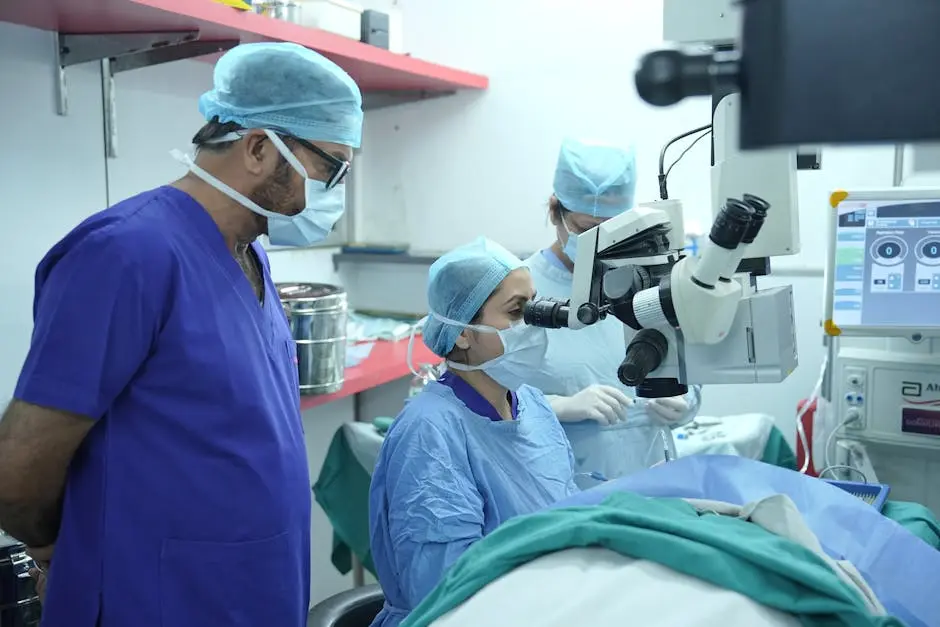
Cataract surgery is a common procedure that can significantly improve your vision and quality of life. However, the thought of undergoing eye surgery can be daunting if you’re unsure of what to expect. In this blog, we’ll walk you through the entire process, addressing the main stages and considerations, so you can approach your surgery with confidence and peace of mind.
What to Do Before Surgery
Before your cataract surgery, it’s essential to attend a pre-operative visit with your ophthalmologist. During this visit, your doctor will conduct a thorough eye examination, discuss the procedure, and answer any queries you might have. This is also the time to discuss any prescription medications you are currently taking and whether any adjustments are necessary. Proper preparation will help set your mind at ease and ensure that everything is in place for a successful procedure.
In the days leading up to your surgery, you’ll need to follow certain dietary and medication guidelines. For example, your doctor might recommend avoiding any solid food several hours before your procedure to prevent complications while under anesthesia. They may also prescribe antibiotic eye drops to reduce the risk of infection. Adjusting your diet and medication intake as advised is crucial in ensuring a smooth operation.
Lastly, arrange for transportation to and from the surgery due to the effects of anesthesia and temporary changes in vision. You won’t be able to drive yourself home, so having a trusted friend or family member assists with this can remove any added stress on the day of your surgery.
The Day of the Surgery
On the day of your surgery, you will arrive at the facility, where you will check in and complete any remaining paperwork. Comfortable clothing is recommended, as it helps you relax and makes your experience more pleasant. You will be asked to remove any jewelry or accessories that might interfere with the procedure.
Before your surgery begins, the medical team will conduct a series of pre-operative procedures. These may include administering eye drops to dilate your pupils and a mild sedative to ensure you are calm and comfortable during the procedure. You might also meet your anesthesiologist, who will discuss the anesthesia plan with you.
During the Surgery
Cataract surgery typically takes about 15 to 30 minutes, during which a local anesthetic is used to numb your eye. You will be awake but should feel relaxed and will not experience any pain thanks to the sedative and anesthesia. The ophthalmologist will make a small incision at the edge of your cornea to remove the cloudy lens and replace it with a clear artificial lens. This intraocular lens is usually customized to match your vision needs.
A great advantage of cataract surgery is its high success rate and the significant improvement in vision that most patients experience soon after. Understanding that the procedure is minimally invasive can reassure you and allow you to focus on the benefits awaiting post-surgery.
Post-Surgery Care
After the procedure, you will be taken to a recovery area where you will rest for a short period, usually around 30 minutes. Here, the medical staff will monitor your condition to ensure there are no immediate complications. Once stabilized, you can go home with your companion.
For the first few days post-surgery, you must take care to protect your eye from potential harm. Wearing an eye shield at night and sunglasses when outside can prevent accidental bumps and sun damage. Adhering to your doctor’s guidelines regarding eye drops and medication is critical to a swift and safe recovery.
Attending follow-up appointments will allow your ophthalmologist to monitor your healing process and address any concerns. During these visits, your doctor will evaluate your visual improvement and advise when you can gradually resume normal activities, such as driving or exercising.
Potential Risks and Complications
Like any surgery, cataract surgery carries some risks and potential complications, although they are rare. These can include infection, bleeding, swelling, or retinal detachment. Fortunately, with modern surgical techniques and the expertise of our ophthalmologists at Mid-Atlantic Eye Care, these risks are significantly minimized.
Should any complications arise, they are usually manageable with prompt medical care. Patients are encouraged to contact their ophthalmologist immediately if they notice any unusual symptoms post-surgery, like severe pain or sudden vision changes.
Wrapping Up: Your Cataract Surgery Journey
Cataract surgery is a straightforward and highly effective procedure. By understanding what to expect before, during, and after the surgery, you can ensure a smoother experience and a quicker recovery. For more information or to book an appointment, visit our homepage. Don’t hesitate to reach out to your healthcare team with any questions or concerns you may have.

